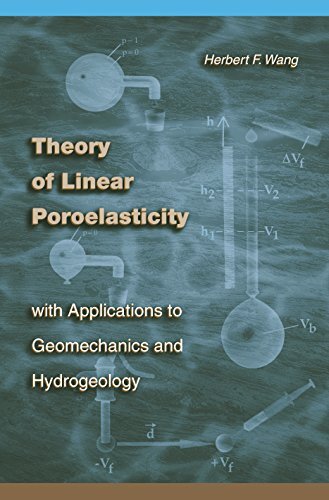
Theory of Linear Poroelasticity with Applications to Geomechanics and Hydrogeology (Princeton Series in Geophysics Book 2) (English Edition)
- 作者
- Herbert F. Wang
- 语言
- 英语
- 电子书格式
- epub,pdf,mobi,azw3,txt,fb2,djvu
- 下载次数
- 3051
- 更新日期
- 2023-08-08
- 运行环境
- PC/Windows/Linux/Mac/IOS/iPhone/iPad/iBooks/Kindle/Android/安卓/平板
内容简介
The theory of linear poroelasticity describes the interaction between mechanical effects and adding or removing fluid from rock. It is critical to the study of such geological phenomena as earthquakes and landslides and is important for numerous engineering projects, including dams, groundwater withdrawal, and petroleum extraction. Now an advanced text synthesizes in one place, with one notation, numerous classical solutions and applications of this highly useful theory. The introductory chapter recounts parallel developments in geomechanics, hydrogeology, and reservoir engineering that are unified by the tenets of poroelasticity. Next, the theory's constitutive and governing equations and their associated material parameters are described. These equations are then specialized for different simplifying geometries: unbounded problem domains, uniaxial strain, plane strain, radial symmetry, and axisymmetry. Example problems from geomechanics, hydrogeology, and petroleum engineering are incorporated throughout to illustrate poroelastic behavior and solution methods for a wide variety of real-world scenarios. The final chapter provides outlines for finite-element and boundary-element formulations of the field's governing equations. Whether read as a course of study or consulted as a reference by researchers and professionals, this volume's user-friendly presentation makes accessible one of geophysics' most important subjects and will do much to reduce poroelasticity's reputation as difficult to master.
Theory of Linear Poroelasticity with Applications to Geomechanics and Hydrogeology (Princeton Series in Geophysics Book 2) (English Edition) EPUB, PDF, MOBI, AZW3, TXT, FB2, DjVu, Kindle电子书免费下载。
- On Writing the College Application Essay, 25th Anniversary Edition: The Key to Acceptance at the College of Your Choice (English Edition) Harry Bauld
- Navigation Control Manual (English Edition) A G Bole、C E Nicholls、W O Dineley
- 电工技术.电工学.1 苗松池
- Leckie SNAP Revision – National 5/Higher English Revision: Poetry by Norman MacCaig: Revision Guide for the New 2019 SQA English Exams (English Edition) David Cockburn
- Tent Life in Siberia (English Edition) George Kennan
- Telecommunications Cost Management (English Edition) William A. Yarberry, Jr.、Brian DiMarsico、Thomas Phelps, IV
- Map Projections: A Reference Manual (English Edition) L M Bugayevskiy、John Snyder
- 五运六气临床用药指南:己亥年—癸卯年 邓杨春
- Leckie SNAP Revision – National 5/Higher English Revision: Reading for Understanding, Analysis and Evaluation: Revision Guide for the New 2019 SQA English Exams (English Edition) David Cockburn
- 石墨烯薄膜制备 李雪松、陈远富、青芳竹
- 期货操盘这些年 王孝明
- 建筑装饰工程材料与构造 何公霖、杨龙龙、唐海艳
- Disclosing Horizons: Architecture, Perspective and Redemptive Space (English Edition) Nicholas Temple
- Basic Math Concepts: For Water and Wastewater Plant Operators (Mathematics for Water and Wastewater Treatment Plant Operato) (English Edition) Joanne K. Price
- 五运六气三十二讲 柳少逸
- 小女人理财锦囊 游凌燕
- 制药生产实习指导——药物制剂 何志成、陈宇洲
- The Handbook of Task Analysis for Human-Computer Interaction (English Edition) Dan Diaper、Neville Stanton
- Scorpion (English Edition) Andrew Kaplan
- 建设工程质量管理 许春霞
- Hymen (免费公版书) (English Edition) ,H. D. (Hilda Doolittle)
- Geological Hazards: Their Assessment, Avoidance and Mitigation (English Edition) F.G.Bell
- 材料合成与制备技术 朱继平、李家茂、罗派峰
- 基础医古文(十三五) 王育林、段晓华
- Entre Nous: A Woman's Guide to Finding Her Inner French Girl (English Edition) Debra Ollivier
- Global Perspectives on the Ecology of Human-Machine Systems (Resources for Ecological Psychology Series Book 1) (English Edition) John M. Flach、Peter A. Hancock、Jeff Caird、Kim J. Vicente
- Beyond Safety Accountability (English Edition) E. Scott Geller
- A Concise Introduction to Engineering Economics (English Edition) Peter Cassimatis
- 结直肠癌临床实践研究与解析 顾艳宏、陈晓锋、陈治宇
- 机械工程史 张策